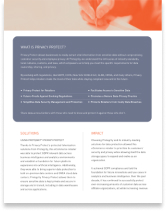Forrester Total Economic Impact Report Avaliable
Protegrity’s Data Protection
Impact on Retail

Maintain Compliance & Reduce Breach Risks
Protegrity offers an array of centrally managed and auditable data protection methods to meet PCI-DSS, Nacha, and PII requirements. This ensures that your data protection and security standards meet industry and audit requirements and that you preserve your organization’s reputation while reducing its risk profile.
Global Compliance
Comply with global data security and privacy regulations, without affecting business transactions and relations
Evergreen Solutions
Protegrity gateways, integrations, and solutions are regularly updated, to evolve with regulations
Case Studies
Our Retail Partners
Protegrity meets — and in many cases, exceeds — the performance expectations of the largest retailers in the world. When implementing joint solutions, we work closely with system integrators, independent software vendors (ISVs), and large cloud hyper scalers to develop custom Protegrity integrations that eliminate friction for our retail customers.
01
What Is Retail Data Management?
Retail data management is the process of managing inventory, transactional information, PII, and PCI. This also includes personal account data of customers, customer activity, and any other data contributing to further processes, growth, and analytics. Along with these factors, managing retail data also covers where that data is stored (in the cloud and on-premises warehouses), how it moves (data in transit), and how it’s used (transactions, analytic pursuits, and account access).
02
What Data and Data Protection Is Important for Retail?
Having the right level of access is integral to securing any type of data, from customer names to supply chain information. The use of cloud, hybrid system solutions, and data protection platforms must be accounted for when protecting retail data.
03
What Are the Principles of Data Protection?
The seven core principles are: lawfulness, fairness, and transparency; purpose limitation; data minimization; accuracy; storage limitation; integrity and confidentiality; and accountability.
04
What Do Retailers Need to Know About GDPR and Data Privacy?
Due to the ability of consumers to make purchases across physical borders, retailers need to be aware of both GDPR and their data privacy solutions. While it may be more obvious if a retailer conducts business in Europe, it’s important to note that in the United States, more and more individual states and localities are starting to institute their own GDPR-like regulations for their purchasing constituents (such as CCPA and the CPA). Retailers are accountable to the seven principles that hold retailers responsible for proactively complying with — and demonstrating compliance with — the regulations. GDPR seeks to enforce the expanded data privacy rights of individuals in the EU, which requires adequate protection from businesses both within and outside of its borders. If your retail business deals with the personal data of individuals in the EU in any way, then the GDPR likely applies to you.
05
How Can Retailers Prepare to Meet New Data Privacy Regulations?
One basic way retailers can prepare to meet new data privacy regulations is by publishing a privacy policy informing consumers how they collect, use, and share their customers’ information. Retailers should also be aware that some laws give customers the right to request their data by learning more about the retailer’s data handling practices. They can also request copies of the personal information that the retailer has maintained. Customers can additionally demand that their information be deleted, be allowed to opt-out of the use of their data for advertising, and opt-out from their data being sold to third parties.
06
Do Protegrity solutions protect data in multiple languages?
Yes! Protegrity’s quantum-resistant Vaultless Tokenization enables alphabet, format, and length-preserving data security for all of the world’s languages, including Eastern character sets.
Take the next step
See how Protegrity’s fine grain data protection solutions can enable your data security, compliance, sharing, and analytics.
Get an online or custom live demo.










